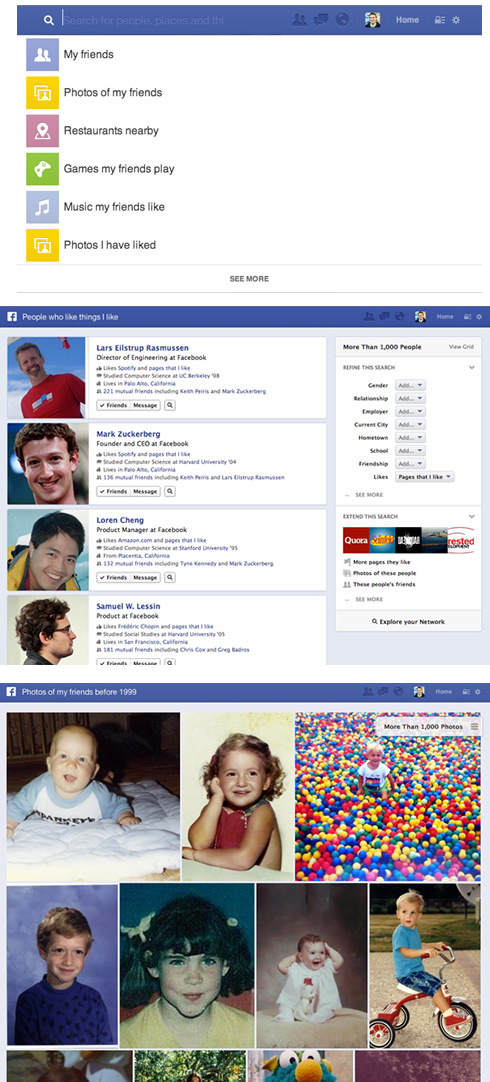
Facebook Introduces Graph Search
Facebook today announced a tool called Graph Search that will let users search their networks for information that has been shared with them.
Chief executive Mark Zuckerberg announced the new feature Tuesday morning at Facebook's headquarters.
Graph Search will appear as a bigger search bar at the top of each page. When you search for something, that search not only determines the set of results you get, but also serves as a title for the page. You can edit the title - and in doing so create your own custom view of the content you and your friends have shared on Facebook.
Zuckerberg showed that users can simply type in the top blue bar of the Facebook website for things such as "Movies my friends like" or "Photos of my friends in 2009."
The results are then displayed and ranked based off of the "people you care the most about." Zuckerberg said the results can also be filtered in a number of ways, including geographically.

Another difference from web search is that every piece of content on Facebook has its own audience, and most content isn't public. The Facebook co-founder said that Graph Search is privacy-aware. He said Facebook's engineers built Graph Search from the start with privacy in mind, and it respects the privacy and audience of each piece of content on Facebook. It makes finding new things much easier, but you can only see what you could already view elsewhere on Facebook. Graph Search follows users' current privacy settings, meaning that they can only search for content that has been shared with them. Through the Activity Log, users can control tags, photos or posts with locations about them.
The first version of Graph Search focuses on four main areas -- people, photos, places, and interests.
People: "friends who live in my city," "people from my hometown who like hiking," "friends of friends who have been to Yosemite National Park," "software engineers who live in San Francisco and like skiing," "people who like things I like," "people who like tennis and live nearby"
Photos: "photos I like," "photos of my family," "photos of my friends before 1999," "photos of my friends taken in New York," "photos of the Eiffel Tower"
Places: "restaurants in San Francisco," "cities visited by my family," "Indian restaurants liked by my friends from India," "tourist attractions in Italy visited by my friends," "restaurants in New York liked by chefs," "countries my friends have visited"
Interests: "music my friends like," "movies liked by people who like movies I like," "languages my friends speak," "strategy games played by friends of my friends," "movies liked by people who are film directors," "books read by CEOs"
Facebook also said it has a partnership with Microsoft?s Bing search, which will deliver additional results from the Web when Graph Search doesn?t deliver clear answers to queries.
The feature is currently in a beta phase. Facebook did not say when the feature will be available to users.
With Graph Search, Facebook is trying to make its millions of users foster more irect links to each other. For users,it is a new way for them to find people, photos, places and interests that are most relevant to their on Facebook. Graph Search will also help users explore photos, find places like local attractions and restaurants, and learn about common interests like music, movies, books and more. All results are unique based on the strength of relationships and connections.
Facebook graph search will also leverage member data to provide advertisers with more targeted, personalized advertising opportunities going forward. Ofcourse Facebook needs to tread carefully and be mindful of user privacy.
Graph Search will appear as a bigger search bar at the top of each page. When you search for something, that search not only determines the set of results you get, but also serves as a title for the page. You can edit the title - and in doing so create your own custom view of the content you and your friends have shared on Facebook.
Zuckerberg showed that users can simply type in the top blue bar of the Facebook website for things such as "Movies my friends like" or "Photos of my friends in 2009."
The results are then displayed and ranked based off of the "people you care the most about." Zuckerberg said the results can also be filtered in a number of ways, including geographically.

Another difference from web search is that every piece of content on Facebook has its own audience, and most content isn't public. The Facebook co-founder said that Graph Search is privacy-aware. He said Facebook's engineers built Graph Search from the start with privacy in mind, and it respects the privacy and audience of each piece of content on Facebook. It makes finding new things much easier, but you can only see what you could already view elsewhere on Facebook. Graph Search follows users' current privacy settings, meaning that they can only search for content that has been shared with them. Through the Activity Log, users can control tags, photos or posts with locations about them.
The first version of Graph Search focuses on four main areas -- people, photos, places, and interests.
People: "friends who live in my city," "people from my hometown who like hiking," "friends of friends who have been to Yosemite National Park," "software engineers who live in San Francisco and like skiing," "people who like things I like," "people who like tennis and live nearby"
Photos: "photos I like," "photos of my family," "photos of my friends before 1999," "photos of my friends taken in New York," "photos of the Eiffel Tower"
Places: "restaurants in San Francisco," "cities visited by my family," "Indian restaurants liked by my friends from India," "tourist attractions in Italy visited by my friends," "restaurants in New York liked by chefs," "countries my friends have visited"
Interests: "music my friends like," "movies liked by people who like movies I like," "languages my friends speak," "strategy games played by friends of my friends," "movies liked by people who are film directors," "books read by CEOs"
Facebook also said it has a partnership with Microsoft?s Bing search, which will deliver additional results from the Web when Graph Search doesn?t deliver clear answers to queries.
The feature is currently in a beta phase. Facebook did not say when the feature will be available to users.
With Graph Search, Facebook is trying to make its millions of users foster more irect links to each other. For users,it is a new way for them to find people, photos, places and interests that are most relevant to their on Facebook. Graph Search will also help users explore photos, find places like local attractions and restaurants, and learn about common interests like music, movies, books and more. All results are unique based on the strength of relationships and connections.
Facebook graph search will also leverage member data to provide advertisers with more targeted, personalized advertising opportunities going forward. Ofcourse Facebook needs to tread carefully and be mindful of user privacy.





















